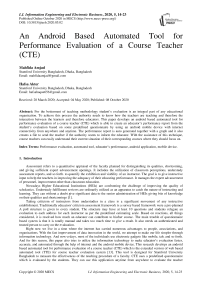An Android Based Automated Tool for Performance Evaluation of a Course Teacher (CTE)
Автор: Mahfida Amjad, Hafsa Akter
Журнал: International Journal of Information Engineering and Electronic Business @ijieeb
Статья в выпуске: 5 vol.12, 2020 года.
Бесплатный доступ
For the betterment of teaching methodology student’s evaluation is an integral part of any educational organization. To achieve this process the authority needs to know how the teachers are teaching and therefore the interaction between the learners and therefore educators. This paper develops an android based automated tool for performance evaluation of a course teacher (CTE) which is able to create an educator’s performance report from the student’s evaluation based on some predefined questionnaire by using an android mobile device with internet connectivity from anywhere and anytime. The performance report is auto generated together with a graph and it also creates a file to send the teacher if the authority wants to inform the educator. With the assistance of this technique, course teachers can easily understand their current situation of their corresponding courses where they should focus on.
Performance evaluation, automated tool, educator’s performance, android application, mobile device
Короткий адрес: https://sciup.org/15017415
IDR: 15017415 | DOI: 10.5815/ijieeb.2020.05.02
Список литературы An Android Based Automated Tool for Performance Evaluation of a Course Teacher (CTE)
- Suman Bhatnagar, Prof. Prashant Sahai Saxena, “Analysis of Faculty Performance Evaluation Using Classification”, International Journal of Advanced Research in Computer Science, Volume 9, No. 1, 2018.
- Eric S Taylor & John H Tylor, “The Effect of Evaluation on Teacher Performance”, American Economic Review, 2012.
- Peterson, Kenneth. (2004). Research on School Teacher Evaluation. Nassp Bulletin. 88. 60-79. 10.1177/019263650408863906.
- Wenglinsky, H., “How schools matter: The link between teacher classroom practices and student academic performance” Education Policy Analysis Archives, 2012.
- Daley, Glenn A. and Lydia Kim, “A Teacher Evaluation System That Works” The National Institute for Excellence in Teaching (NIET), 2010.
- Boran Sekeroglu, Kamil Dimililer, Kubra Tuncal, “Student Performance Prediction and Classification Using Machine Learning Algorithms”, 8th International Conference on Educational and Information Technology, Pages 7–11, March 2019, https://doi.org/10.1145/3318396.3318419.
- En.wikipedia.org, Android Studio. [online] Available at: https://en.wikipedia.org/wiki/Android_Studio.
- Firebase.google.com, Firebase Realtime Database. [online] Available at: https://firebase.google.com/docs/database
- Firebase.google.com, Firebase Authentication. [online] Available at: https://firebase.google.com/docs/auth.
- Noman Islam, “A Three-Pronged AI Solution for Faculty Evaluation”, Presented at International Conference on Innovation and Emerging Trends in Business Management, Education and Social Sciences, 9-10 January, 2018.
- G. Gutiérrez, J. Ponce, A. Ochoa, M. Álvarez, “Analyzing Students Reviews of Teacher Performance Using Support Vector Machines by a Proposed Model”, International Symposium on Intelligent Computing Systems (ISICS), pp 113-122, 2018.
- Alok Kumara, Renu Jainb, “Faculty Evaluation System”, 6th International Conference on Smart Computing and Communications (ICSCC), December 2017.
- Mahfida Amjad, Nusrat Jahan Linda, “A Web Based Automated Tool for Course Teacher Evaluation System (TTE)”, International Journal of Education and Management Engineering 10(2):11-19, DOI: 10.5815/ijeme, April 2020.


